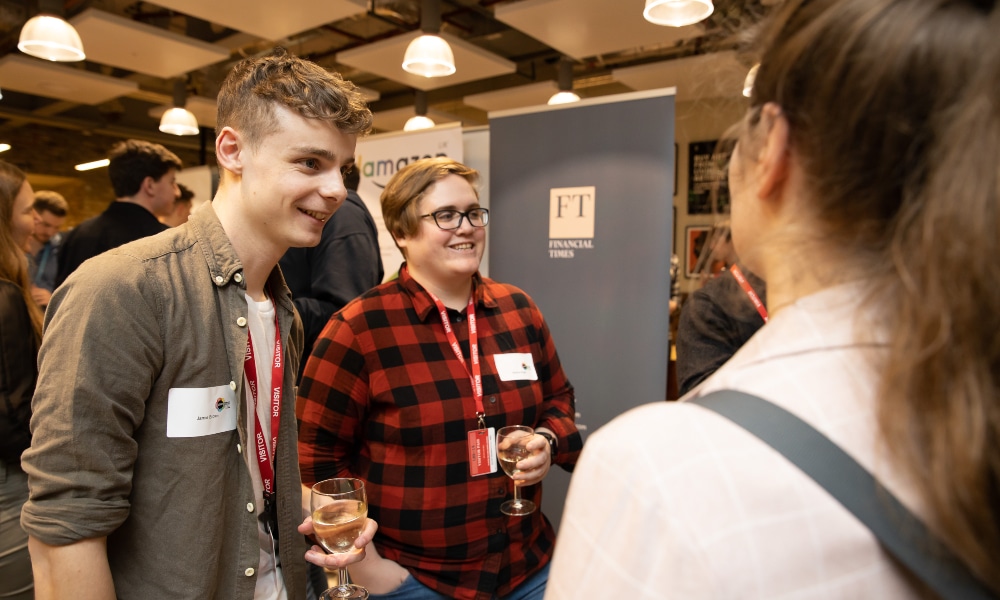Financial Times is looking for young, inquisitive queer journalists for its unique trainee programme

Members of Pride FT, the LGBT+ wing of the Financial Times. (Supplied)
Young queer journalists are being encouraged to apply for the Financial Times’ Paul McClean graduate trainee programme, a unique opportunity to shore up skills at one of the world’s leading business publications.
With under-25s seeing sharp rises in unemployment and graduate job vacancies drying up, it can seem that career prospects are shrinking. Fast.
But not so at the Financial Times, where the Paul McClean graduate trainee programme has just opened for applications.
Named after one of the Financial Times‘ most promising graduate trainees, who sadly passed away in 2017, the scheme sees successful candidates emerge as qualified journalists in just three years.
The graduate programme was launched in 1986 – and two of the first three graduate trainees are still there today.
Each cohort is taught the skills vital for today’s newsrooms – writing, media law and data journalism – and will get to rub shoulders with top journalists heading up individual sections within the FT.
To learn about the international readership of the FT, graduates are sent on four six-month placements on different news desks, such as the bustling newsrooms of New York, San Francisco, Paris or Brussels – certainly worse places to spend six months in.
The rotations mean the trainee really gets to know the FT and gains a solid grounding in its core subjects and values. After two years, the trainee applies for a permanent job, and by the end of that third year, they become a fully-qualified FT journalist.
“We are very keen to have as wide and diverse an application pool as possible,” says Scheherazade Daneshkhu, director of editorial talent.
“The FT is a truly global news organisation with an extensive international readership. So we want to reflect the world as it is by promoting a diverse and inclusive workforce. We want the richness of understanding and thought of LGBT+ employees as part of that diversity.”
PinkNews spoke to FT veterans Hannah Sarney and Cassius Naylor about their experiences. Both Hannah and Cassius are members of Proud FT, the LGBT+ network.
PinkNews: Has the experience of being out at the FT been different from other places you have worked?
Cassius: Most definitely! Pretty much everywhere else I’ve worked has been tolerant and inclusive (some more so than others) of my being queer but it goes further than that at the FT: I feel celebrated, and empowered, for my identity.
Hannah: Being out at the FT is easy and encouraged. That support comes right from the top. Our editor, Roula Khalaf, is the board-level sponsor of Proud FT. Senior staff – LGBT+ and allies – always attend and engage with employee group events, including Proud FT.
I’ve worked in a number of newsrooms and never experienced anything like that kind of support before.
Does being a member of Proud FT have an impact on your working life?
Hannah: Proud FT is a wonderful support network of people who genuinely want to make a positive impact on the company and the wider community. It inspires me – and it brings a lot of friends and fun!
Cassius: My involvement in Proud – coupled with the esteem in which the group is held – has made me a more confident and generally more enthusiastic colleague.

(Paul Grace)
There are real emotional and thus professional, gains to be had from feeling part of a community at work.
Proud has also allowed me to connect with people from all across the global FT in a way that I might not have ever done without it.
I’ve worked across the events, specialist publications and communications divisions of this company through my career but Proud brings together tech, editorial, marketing, HR and business colleagues in a way that doesn’t happen often in any firm.
We collaborate on issues that are very personal to us and that makes us better in our day jobs, more empathetic, interdisciplinary and allows engagement with very senior management. It’s true to say that I literally would not have my current role if it weren’t for Proud.
What’s your favourite thing about working alongside Proud FT members?
Hannah: My favourite moments are when we all get together – in person or virtually. So much laughter.
And we always seem to come up with another project that will make the FT an even better place to work. Our ‘coming out at work’ series of personal stories by FT staff is one of my favourites.
The reader response was so positive we published a follow-up highlighting their stories too.

(Paul Grace)
Cassius: We’re a very unique group of people. There is immense personal and professional respect within our organisation and a genuine determination toward justice that’s rare in the corporate world.
We’re all at the FT because we believe in its mission, and we’re all in Proud because of the same reason.
The commonality in worldview that results is part of the reason why my best friends in the FT are my Proud colleagues. The other part is that we’re genuinely a fun bunch. Odd, but fun. We know we’re both an employee network – with a mandate to campaign and educate – and a safe community for queer people.
Proud really gives people an opportunity to shine. The work we do is noticed, valued, and it has a real impact. We’re given the space and resources to reach our goals and are considered in the highest-levels of the business.
At an organisation like ours, that really matters.
Click here to apply for the Financial Times’ Paul McClean graduate trainee programme.

